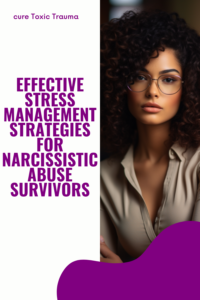 tress is an inevitable part of life, and for survivors of narcissistic abuse, it can be particularly challenging to navigate. The aftermath of narcissistic abuse can leave deep emotional wounds, making it crucial for survivors to develop healthy strategies for managing stress. By adopting the right mindset and implementing practical techniques, survivors can regain control over their lives and promote their overall well-being. Here are some effective stress management strategies specifically tailored for narcissistic abuse survivors:
tress is an inevitable part of life, and for survivors of narcissistic abuse, it can be particularly challenging to navigate. The aftermath of narcissistic abuse can leave deep emotional wounds, making it crucial for survivors to develop healthy strategies for managing stress. By adopting the right mindset and implementing practical techniques, survivors can regain control over their lives and promote their overall well-being. Here are some effective stress management strategies specifically tailored for narcissistic abuse survivors:
- Reframe Your Attitude: Begin by shifting your perspective on problems. Instead of dwelling on the negative aspects or potential pitfalls, try to maintain a positive outlook. By reframing the situation, you can maintain a balanced perspective and reduce stress levels.
- Express Your Feelings: Holding in emotions can intensify stress. If someone or something is bothering you, find a respectful way to communicate your concerns. Expressing your feelings can help clear the air and promote emotional healing.
- Engage in Regular Exercise: Physical activity not only benefits your body but also has a positive impact on your mind. Incorporate exercise into your daily routine, whether it’s a brisk walk, a run, swimming, or dancing. These activities can provide a calming effect that lasts for hours, reducing stress and promoting overall well-being.
- Maintain a Balanced Diet: Pay attention to your diet and make healthy choices. Opt for a well-balanced meal plan that is low in sugar and caffeine, as these substances can exacerbate stress and anxiety. Similarly, limit your consumption of alcohol and non-prescription drugs, as they can interfere with sleep and impair your ability to focus.
- Prioritize Quality Sleep: Adequate sleep is crucial for managing stress, but it can be challenging for abuse survivors to find restful slumber. Establish a bedtime routine to relax your mind and body. Consider soaking in a scented bath, journaling, or listening to soothing music before bed to promote relaxation and prepare for a restful sleep.
- Time Management: Effective time management can significantly reduce stress levels. Learn to say no to additional projects or commitments that may overwhelm you. Avoid over-scheduling by breaking big tasks into smaller, manageable steps. Delegate responsibilities when possible, and remember to prioritize self-care.
- Find Joy in Laughter and Gratitude: Release tension and promote relaxation by incorporating laughter and smiles into your life.
 Surround yourself with friends who bring joy and watch funny movies or videos. Additionally, cultivate forgiveness and gratitude. Accept that imperfections and mistakes are part of life, forgive yourself and others, and focus on the positive aspects of your life.
Surround yourself with friends who bring joy and watch funny movies or videos. Additionally, cultivate forgiveness and gratitude. Accept that imperfections and mistakes are part of life, forgive yourself and others, and focus on the positive aspects of your life. - Seek Solitude and Silence: Take short breaks from the noise and distractions of everyday life. Find a private space, whether it’s a quiet room or a serene natural setting, and spend a few minutes in silence. Close your eyes, focus on your breathing, and savor the peace and quiet. This brief respite from noise pollution can help you relax and recharge.
- Seek Support: Sharing your experiences and concerns with trusted friends and family members can alleviate stress. Surround yourself with a support network that understands your journey and provides a safe space for you to express yourself.
- Engage in Mind-Body Techniques: Your mind is a powerful tool in stress management. Practice positive thought management by embracing a positive mindset and challenging negative self-talk. Engage in daily meditation to cultivate mindfulness, self-compassion, and forgiveness. Consider using essential oils, such as lavender or chamomile, to relax your mind and body. Light scented candles and create a calming bedtime ritual.
- Relaxation Techniques: Explore various relaxation techniques to calm your mind and body. Gentle yoga poses, mindfulness meditation, spiritual reflection, muscle relaxation exercises, and deep breathing exercises
In conclusion, managing stress as a survivor of narcissistic abuse requires a tailored approach that addresses the unique challenges and emotional wounds experienced. By adopting a positive attitude, expressing emotions, engaging in regular exercise, maintaining a balanced diet, prioritizing quality sleep, practicing effective time management, finding joy in laughter and gratitude, seeking solitude and silence, seeking support, and utilizing mind-body techniques, survivors can effectively manage stress and promote their overall well-being. Remember, stress management is a journey, and with consistent effort and self-care, survivors can regain control over their lives and experience greater peace and happiness.
Learn to Manage you life with The Busy Woman’s Organized Life Planner. Click below to Download FREE:






Leave a Reply